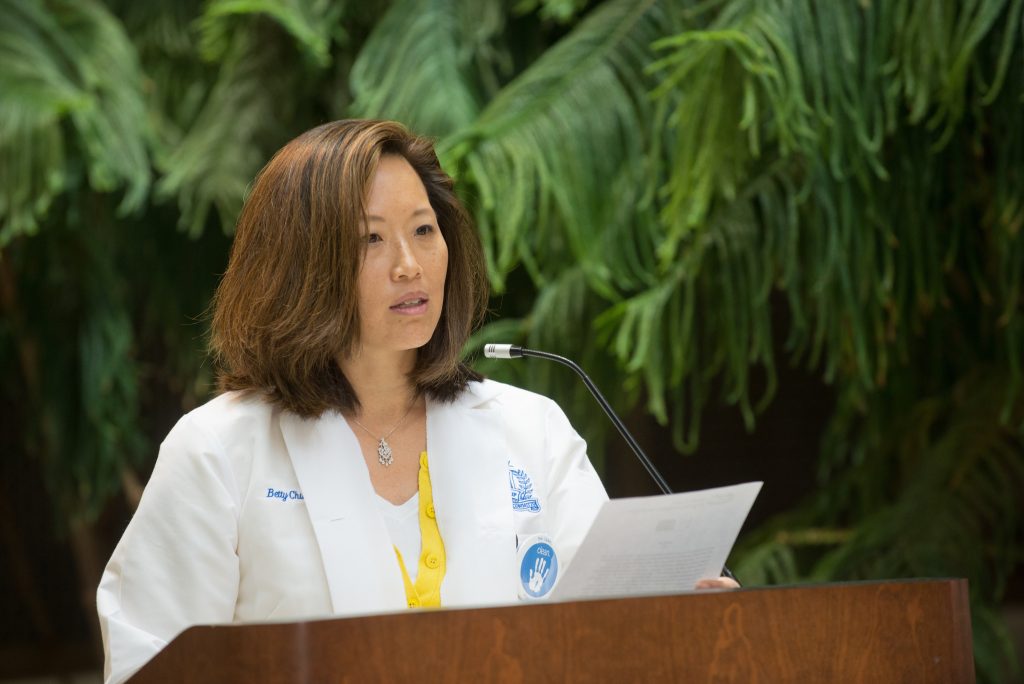Source: Ross School of Business
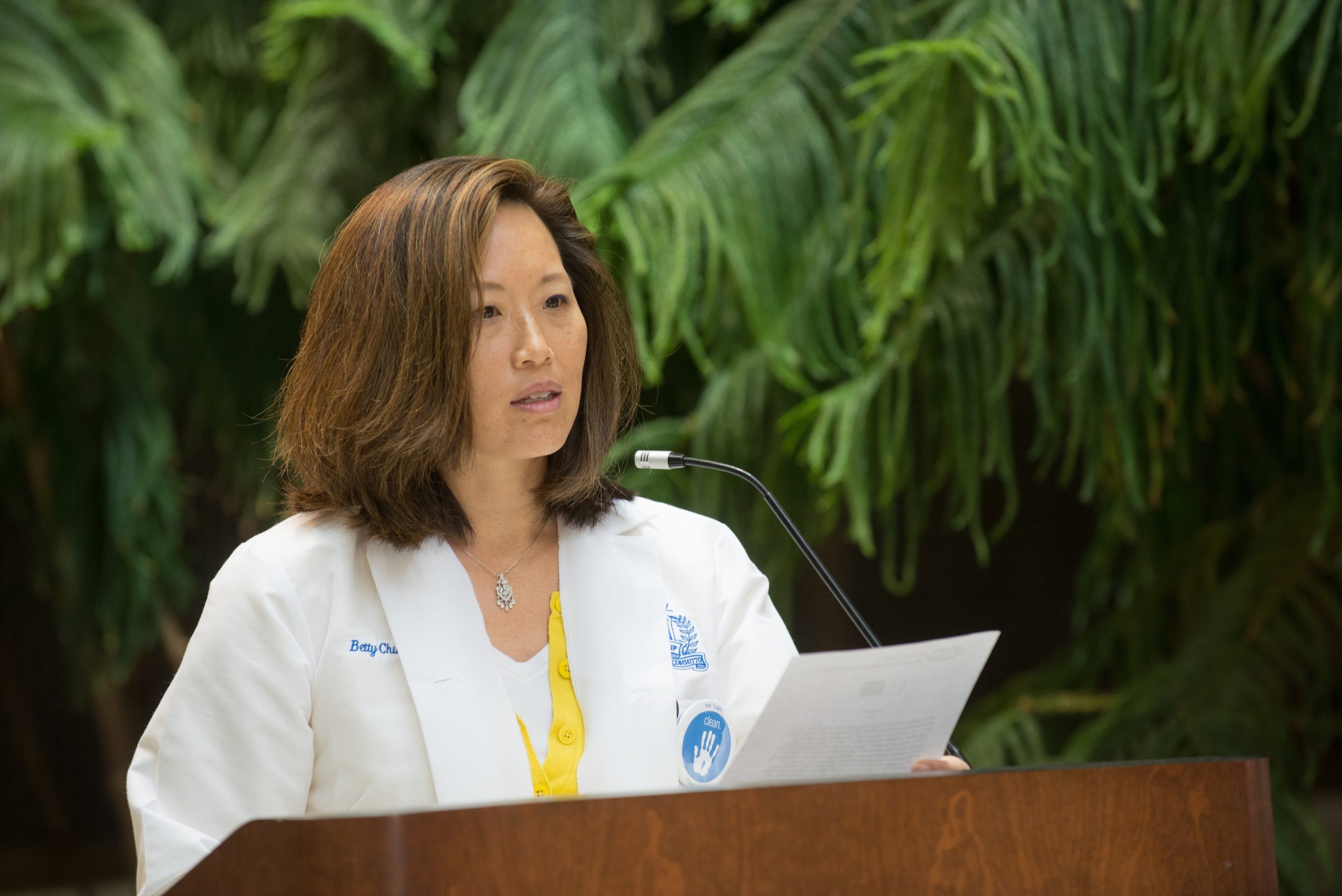
Dr. Betty Chu leads Henry Ford Health System’s response to COVID-19.
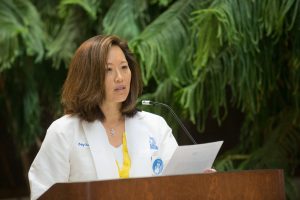
Dr. Betty Chu leads Henry Ford Health System’s response to COVID-19.
More Info
Even before cases of the COVID-19 virus were quickly escalating across Metro Detroit, the U.S., and around the globe, Dr. Betty Chu, MBA `13/MD `95, was planning and directing the actions Henry Ford Health System would take to manage the crisis.
As the incident commander for the HFHS team, Chu woke at 5 a.m. and thought about COVID-19 all day. It’s a role far different from her normal “day job” — the senior vice president, associate chief clinical officer, and chief quality officer at HFHS — and it required a different way of leading her team.
“In crisis management, you’re focused on the objectives that need to be completed in a 24-hour period of time to keep people safe,” Chu said. “Your speed to action and your directive to action are different in a crisis, meaning stakeholder input is accelerated and there isn’t time for so many revisions.”
As Michigan’s coronavirus curve flattened in late May and early June, the health system dismantled the special crisis team. But Chu still spends much of her day thinking about COVID-19. Her office continues to research and monitor COVID-19 stats. It recently surveyed all of its employees and used lessons learned from the crisis “to make sure we have good planning going into the fall.”
Looking out for the community
Chu’s day-to-day life began to change when the first cases of COVID-19 appeared far away in China. She and her team started a planning process and daily huddles with specialists to discuss how HFHS would handle the virus if it came to the U.S. When the virus did arrive in the U.S., Chu was placed at the center of the incident command structure that was developed for the health system.
“That was in January when we began to track the virus on a daily basis,” she said. “We opened our incident command the first week in March, had peak cases the second week in April. By late May/early June, we started to see more of a leveling. We still have COVID patients, but it is not straining our capacity in any way. All our normal operations are open now.”
Chu said she has been most proud of how HFHS has been viewed as a community partner, as well as how the community has supported the system’s workers on the frontline through donations of masks, food, and monetary gifts. And those gifts are still coming in.
“We have raised a tremendous amount of money from the community to help support health care workers, and we’ve put that into a COVID employee support fund,” she said. “Employees can access the fund to pay rent if their spouse has lost a job. The economic hardship has been devastating.”
For her work and expertise leading HFHS’s response to the COVID-19 crisis, Chu has emerged as a trusted source for local news media disseminating information on the coronavirus and its spread. Her insightful commentary has been featured in a variety of news organizations, including a March appearance on WDIV’s “Flashpoint” show.
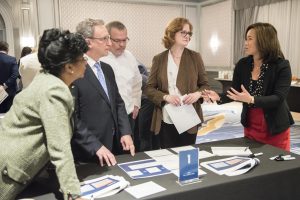
Dr. Betty Chu, far right, speaks with attendees of a Leadership Summit in 2019.
“I came to Henry Ford six years ago because it’s a very people-centric organization that cares about the community,” she explained. “So I’m most proud of how our 105-year-old organization has become a fundamental piece of the community – how we are providing the expertise that they need at this very challenging time.”
Drawing from experience
Chu received her bachelor’s, master’s and medical degrees from U-M, but she also departed with something more — a commitment to making the world a better place. She was appointed last month by Gov. Gretchen Whitmer to the Nursing Homes COVID-19 Preparedness Task Force.
“As someone who has received all my degrees from the University of Michigan, I’m very grateful for the organization and the skills and tools I’ve learned from its experts. The education has helped me be successful and I think we are fortunate as a community to have U-M here,” said Chu.
“The university — even though it’s nationally and internationally recognized — does have a commitment to the state and helping it improve,” she said. “The university in my mind has always had a very strong commitment to public health and society. I don’t know if every university has that same level of commitment.”
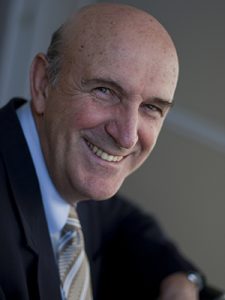
Robert Quinn
Chu has maintained a positive attitude despite the chaos of the crisis. She credits a naturally optimistic personality and her husband and two children for providing a strong support system, but also said she has been able to leverage leadership strategies and tactics she learned at the Ross School of Business.
“The Executive MBA Program has contributed so much to my career, especially the professional development aspects of the program,” Chu said. “I often reflect on the leadership examples that were discussed in Bob Quinn’s course when I planned how to attack this crisis and handle difficult issues like employee anxiety.”
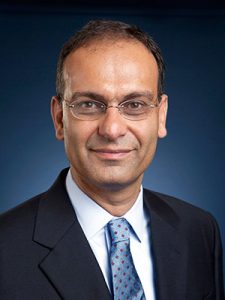
Izak Duenyas
In addition, she said that the skills taught in Izak Duenyas’ supply chain management course have been very helpful in understanding inventory needs for the health system, such as for crucial personal protective equipment like masks.
Preparing for a second wave
Chu said the hospital system is preparing for a second wave in a few ways, including: making sure they have a robust emergency management system in place, actively managing the supply chain, and figuring out how to continue normal operations and surgeries in the face of rising cases. All the while, trying to stay true to HFHS’s mission to provide the highest quality care it can.
“We’ve learned a lot about COVID as a society. Any surge we see will be less than what we saw in March,” she said. “We can still do the kind of care we need to do for heart attacks and strokes and surgeries we need to do. That’s part of our planning now.
The way we are doing that is actively tracking and using predictive analytics to anticipate changes in our volumes.”
Meantime, Chu said she feels very fortunate to be where she is during the pandemic.
“Like everyone, you wake up in the morning and are surprised by where you find yourself. I feel I’m in the right place at the right time,” she said. “I’m just really looking forward to the day when we don’t have to utter COVID again.”

